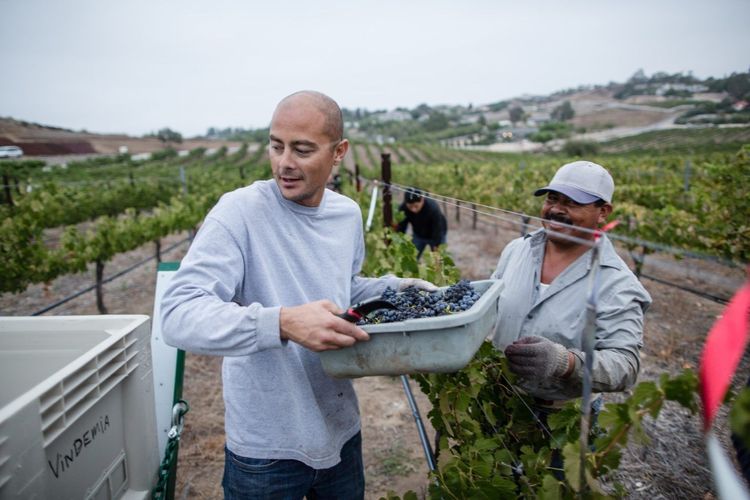
A Guide to Careers in the Wine Industry
Wine brings people together. It sparks conversations, adds to experiences, and helps us celebrate. It’s no surprise there is a demand to be involved in this industry. Working in wine allows you to bring this ancient tradition to people around the world. Being able to impact people’s lives through celebration, breaking of bread, and facilitating experiences is a very special and rewarding thing. Those working in wine are passionate individuals who love keeping this craft alive. The wine industry is thriving. Due to demand and climate change, new wine-producing regions are beginning to pop up around the United States and the world. With it, the demand for careers in this field is continuing to grow. The unique thing about this industry is the number of different roles available to get involved in. Not every sector has this type of career diversity. From viticulture to sales and marketing, there is a role to suit almost every interest. Let’s dive into the types of careers in the wine industry available and the salary expectations for each.
What Wine Industry Jobs are Available?
The wine industry has jobs available for all skill sets and interests. Some of these positions require post-secondary education. But many are apprenticeship opportunities or provide on-the-job training. Careers in the wine industry fall into 5 categories,
Winery Management
Winery management encompasses all of the tasks and jobs at the winery to produce, bottle, age, manage inventory and sell the wine. There are teams of people needed to ensure this process goes according to plan. They fall into 2 streams,
- Winemaking Positions
- Sales and Marketing Positions
Winemaking Positions

1. Oenologist or Winemaker – 80k - 150k
These are the individuals who oversee the entire winemaking process. They direct the process including the amount of time the wine stays in fermentation, how it’s filtered, how it will be aged. They test acidity and sugar levels and monitor the wine as it matures to ensure the final product will have the characteristics they are looking for. NOTE: Some smaller wineries will have the winemaker lead the operations department as well. This allows the winemaker to grow their skills and their salary will grow with it.
2. Assistant Winemaker — 60k - 80k
Assistant winemakers help carry out the vision of the winemaker. They assist with managing staff, the winemaking process, and administrative tasks.
3. Cellar Hand — 35k - 40k
Cellar hands are needed to execute the winemaking process. They are responsible for sorting and crushing grapes, monitoring fermentation tanks, filtration, rotating barrels, and bottling. This is a great learning opportunity for those trying to learn this industry from the ground up.
4. Cellar Master – 60k - 80k
Runs the cellar operations and manages the team of cellar hands. They work with the winemaker and assistant winemaker to ensure they are meeting their targets.
5. Lab Manager – 40k - 55k
Wine is sent to the lab to test acidity levels, sugar levels, and alcohol by volume (ABV). These managers oversee the testing of the wine.
Sales and Marketing Positions
 It doesn’t matter if you make great wine if you can’t get it into the hands of your consumers. These people are the ones who sell your product and help you gain exposure to increase your market share.
It doesn’t matter if you make great wine if you can’t get it into the hands of your consumers. These people are the ones who sell your product and help you gain exposure to increase your market share.
1. Sales Director – 150k - 200k
They manage the sales team. They are responsible for maintaining positive relationships with consumers, finding sales leads, and setting sales targets. Oftentimes they will also sell wine themselves.
2. Director of Operations – 80k - 120k
These are the people who manage the wine inventory and other winery logistics. They work with the winemaker to see if the current vintage is on track for a certain timeline to get to the marketplace.
3. Sales Manager – 50k - 120k
These are the people who actively sell wine. They usually work on commission so there is no real limit to the potential income they can make.
4. Export Manager – 60k - 70k
Depending on the scale of the winery, some will have a separate export manager. They are responsible for sending the correct orders to certain distribution warehouses to ensure they get to the right client. For many wineries, exportation is the only way to grow their business.
5. On-Site Winery Manager – 45k - 60k
When you visit a winery and partake in a wine tour or wine tasting, this is run by the winery manager. They give information on the history of the winery, the types of wine made, and information on the winemaking process.
6. On-Site Sales Associate – 25k - 35k
Many wineries have an on-site retail outlet to sell their wine. These are run by sales associates. They are knowledgeable about the varieties of wine the winery produces as well as general information about the growing region and styles of wine.
Vineyard Management
 Wine wouldn’t be able to exist without the grapes. It takes many dedicated hands to tend to the vines to ensure the best possible grapes are being grown.
Wine wouldn’t be able to exist without the grapes. It takes many dedicated hands to tend to the vines to ensure the best possible grapes are being grown.
1. Vineyard Manager – 65k - 90k
Depending on your skillset and knowledge of viticulture the potential income can vary. If you can produce high-quality fruit, the demand for your vineyard’s grapes will continue to grow.
2. Field Worker – 25k - 35k
These are the people who tend to the vines. They prune, irrigate, and trellis the vines. They execute pest control measures and other tasks assigned by the vineyard manager.
3. Seasonal Grape Pickers – $10 - $15 per hour
Every year the most labor-intensive process is grape harvest. The grapes are delicate and many vineyards choose manual harvesting to reduce grape damage. They rely on a team of grape pickers to harvest. This is a great way to gain exposure to working on a vineyard to see if it’s the right field for you.
Retail

1. Retail Sales – 35k - 50k
Depending on the size of the shop and the types of wine carried will determine the potential revenue you can expect. There is a lot of competition in the marketplace especially when you consider the number of big box stores that sell wine. However, those who can find a niche will be extremely successful.
2. Wine Broker Sales – 50k - 75k
The world of fine wine can be exclusive. This is because there are only a small number of bottles of some of the greatest wines in the world. The way to get your hands on it is to go through a wine broker. They usually work on commission and have the potential to make a high salary if they have the right connections.
Distribution and Importation Management
The only way to get wine to compete on a global stage is to ensure the distribution and importation are being maximized. These are the people who get wine into the hands and on the tables of people around the world.
1. Wine Importer – 60k - 100k
Wine importers are companies that wineries can partner with to have their products distributed within a different market. These companies have existing relationships with restaurants, private clients, and wine shops. They understand what wines will do well in their market and which wines a winery should import to maximize their revenue.
2. Sales Manager – 50k - 120k
Sales managers for wine importers work with sales managers from the winery. They are the ones who actually sell to clients in a market. They are typically commission employees, therefore the salary range is wide, depending on how hard they want to work.
3. Warehouse Manager – 60k - 90k
Also known as a distribution manager. Most wine is brought to central distribution warehouses around the world to be consolidated before being shipped. It takes a great deal of logistics coordination. It’s the only effective way to get the most amount of product shipped in the least amount of containers to effectively manage shipping costs.
Hospitality
When we think of wine, we think of restaurants. Eating and drinking go hand in hand. Many positions involve one-on-one interactions with people. These individuals create an entire experience around wine.
1. Master Sommelier — 100k - 150k
Master sommeliers have gone through training beyond that of a sommelier. They are at the top level of their profession. Usually, these individuals go into education to share their love and passion for wine with the next generation of sommeliers.
2. Sommelier — 80k - 100k
Sommeliers have an extensive amount of training to decipher the nuances in wine. They can take this knowledge and communicate it in a way that a guest will understand. They know the steps of wine service and how to find the perfect bottle of wine to pair with a meal.
3. Restaurant or Bar Manager — 60k - 90k
Not every restaurant will have a sommelier. Restaurant and bar managers have usually worked in the industry for many years and have learned about wine in the process. They are a go to resource for their staff to answer questions. They are also the ones who make the wine list and are in charge of wine purchasing.
4. Restaurant Servers — 50k - 80k
Those who have dedicated their profession to serving have developed a strong base knowledge of wine. This is to be able to make recommendations to guests, drive sales, and grow within their careers.
In Summary: Wine Industry Jobs
The wine industry is growing and evolving. Therefore the number of career opportunities is continuing to grow with it. This industry has many different avenues to pursue. From the science of winemaking to agriculture to front-line customer service, there is something for every interest level. By joining this industry you will be part of a community of people keeping the tradition of wine alive. You will be able to touch the lives of everyday people through unique experiences and celebrated moments. When you choose to join this rewarding career you will open the door to endless opportunities.
Like this? Here are some other aritlces you may like

How to Become a Winemaker
Do you want to learn to make wine? Winemakers have the techniques and skills required to make this delicious beverage!

How To Get a Job in the Wine Industry
The wine industry is one of the most lucrative industries today. With a variety of jobs available , it's no wonder that people are looking to get involved!

The Different Sommelier Levels and How to Get Them: What They Mean for Your Career
There are many different levels of sommeliers and each level can have an affect on a person’s career. Let’s talk about each of them.